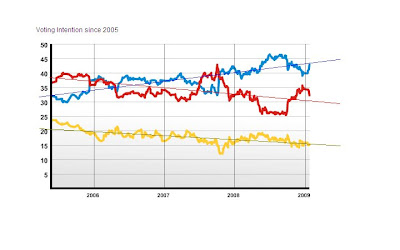
Why are Labour so heavily down in the polls?
There is a big clue in two news pieces that came to me just today via my work in HR:
Over a third of workers are concerned about job security
New research conducted by Nationwide has revealed that 34% of people are currently more concerned about job security than they were a year ago. 1051 UK citizens were involved in the research, which was conducted during November of last year.
The world’s largest building society are advising people to save enough money to cover four months’ salary as an emergency fund. Furthermore, they think it is best that people delay making large purchases until job security returns.
Robin Bailey, director at Nationwide, said: “Job security has become a major concern and it is important that people do not rest upon the hope that they will not experience redundancy. By acting now people can take steps to lessen the financial impact of losing their job and make sure, should the worst happen, they are in the best position to weather the storm and get back into employment as soon as possible.”
UK managers believe their own redundancy is inevitable
One in four UK managers are updating their CV in case they need to start looking for a new job. This is according to new research conducted by the Chartered Management Institute (CMI) that incorporates results of a survey sent out to 1,216 individuals and analysis of calls to the CMI redundancy hotline.
Over a quarter (27%) of those involved in the research are currently trying to develop business networks to uncover new job opportunities. On the positive side, nearly three quarters (73%) argue that there is not as much stigma attached to redundancy than during the 1990s. Furthermore, over half (51%) believe the current economic climate is the perfect opportunity to reassess their career.
Ruth Spellman, Chief Executive of the CMI, says: “Quite clearly, any suggestion that there is already ‘light at the end of the tunnel’ is misplaced. However, if we can help people to dig deep and develop their skills this may enable them to move forwards as well as to move on. There is a worrying lack of concern about helping those who survive redundancy and unless these individuals are given a focus or sense of direction, the spiral of low productivity and morale will continue on a downward trend.”
The unwelcome return of job insecurity brought on by widespread indiscriminate redundancy is in my view the main driver of collapsing support for the Labour Party. Even amongst the most dedicated Labour supporter there lurks the realisation that mass unemployment holds even greater perils for them than it did for John Majors government in 1997 - mainly because people will rightly think 'if Labour can't look after the workers - what use are they to anyone'?
Gordon Browns twelve year boast about how he has personally eradicated 'boom and bust' and saved the world just looks sickening as more and more people pick up a P45 and have their families destroyed and their homes repossessed.
















.jpg)


